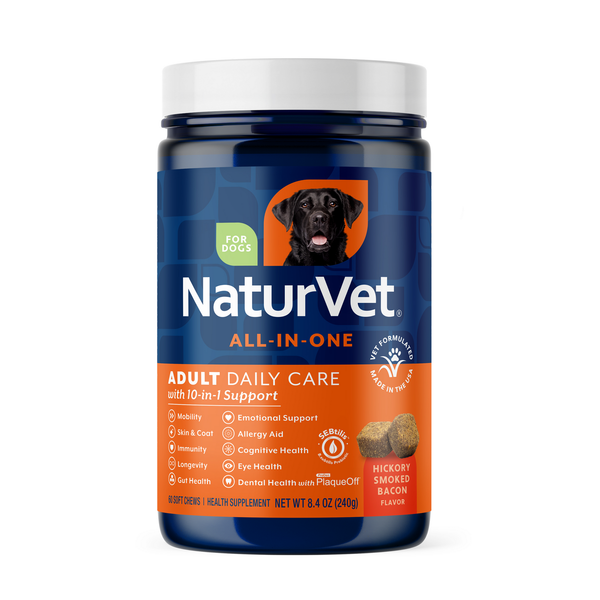Identify & Manage Parasites in Dogs
One reason dogs are oh-so-lovable is that they tend to be energetic and social animals. But did you know that the more active your dog is, the higher their risk of infection? Unfortunately, it’s true. Your dog can contract harmful parasites through seemingly normal, everyday environmental interactions.
If left untreated, worms and other parasites in your dog's intestinal tract can cause serious havoc that might later develop into chronic health conditions. It's your responsibility as a pet parent to protect your canine companion from parasites that can harm their gastrointestinal tract.
In this post, we’ll educate you on the different types of dog worms, how they manifest themselves, and the best management options for dog parasites.
Types of Dog Worms

There are numerous types of worms that can affect the intestinal system, but the most common types of worms in dogs include:
Roundworms

Roundworms are a common parasite inside a dog's intestines. In fact, some puppies are born with roundworms, which proves just how prevalent roundworms are in dogs. The most dangerous types of roundworms are Toxocara canis (T. canis) and Toxascaris leonina. T. canis in puppies.
If untreated, these roundworms could hamper your dog's growth or even transmit to you and/or other humans. Therefore, all dogs or puppies with roundworms must receive veterinary care immediately. A vet can detect the presence of roundworms in dogs through a simple fecal exam.
Tapeworms

Tapeworms are flat, segmented parasites that belong to the family of intestinal worms. These worms have hook-like mouthparts that attach to the dog's intestine. While there are different types of tapeworms, the most common tapeworm in dogs is Dipylidium caninum. It can reach up to 11 inches (30 cm) in length as an adult and cause severe stomach irritations or upsets.
Hookworms

Hookworms use their hook-like mouthpieces to attach themselves to your dog's intestines. Due to their small nature (about 3 millimeters long), hookworms in dogs are difficult to detect. The most common types of hookworms are the Ancylostoma caninum and Ancylostoma braziliense.
If untreated, these tiny worms can deprive your dogs of large amounts of blood as they feed off small blood vessels in its intestinal lining. A vet can diagnose the presence of hookworms in your dog through a microscopic examination of its stool sample.
Whipworms

Whipworms have a thick interior end and a long, thin posterior end that resembles a whip, hence the name. These quarter-inch intestinal parasites attach themselves to the walls of your dog's colon and cecum using the thicker end of their bodies, causing severe complications.
Whipworm infestations are harder to detect since the symptoms in dogs aren't always evident. Even worse, the eggs can survive for up to five years in favorable conditions (moist and warm environments). A vet can detect the presence of whipworms through a fecal sample.
Other types of worms may include ringworms and heartworms, although they're not as common in dogs. The latter of which can be prevented with regular heartworm medication.
Causes of Dog Parasites
So how do dogs get parasites living inside their intestines? There are several ways in which your dog can contract worms. It all depends on the type of environment they're exposed to. The common causes of parasites in dogs include:
- Contaminated milk from the mother
- Sniffing, rolling in, stepping in, licking, or eating contaminated soil
- Ingesting infected prey such as birds, rodents, and reptiles
- Consuming infected mosquitoes and fleas
- Coming into contact or ingesting an infected animal's vomit or feces
- Contact with an infected animal
Although these are the common causes of worms in dogs, other factors could also contribute to your dog's intestinal infection. Therefore, do your due diligence on your dog's exposure before jumping to any conclusions.
Symptoms of Dog Worms
Your dog’s symptoms will vary depending on the type of parasite in their intestines. However, some key signs that you should look out for, indicating your dog may have worms include:
- Decrease in appetite followed by significant weight loss
- Vomiting
- Bloody or mucus-like diarrhea
- Lethargy
- Dragging or rubbing the hindquarters on the ground
- The visible presence of worms (which can look like tiny grains of rice) in dog stool
- Chronic coughing
- 'Pot-bellied' appearance or distended abdomen
- Poor hair coat or hair loss followed by skin irritation
- Visible tapeworm segments attached to the dog's skin or fur, especially around the hind quarters
When your canine companion exhibits some or any of these symptoms, they might be at a critical stage. As such, it's essential to look out for dog worm symptoms often. It’s also important to know that these symptoms could indicate other dog illnesses, so contact your vet if you witness these symptoms.
Treatment Options for a Dog with Intestinal Worms
Dog worms are treatable, provided they're detected, isolated, and treated before advancing to more severe stages. In most cases, your vet may prescribe dewormers and suitable administrative protocols, depending on the parasite and extent of infestation of your dog's intestines as follows:
- For roundworms in dogs: the medication helps detach the parasite from your dog's intestinal tract into their stool for excretion. A second follow-up treatment (three to four weeks later) might be necessary to be safe.
- For tapeworms in dogs: medication provided by the vet breaks apart the tapeworms inside your dog's intestinal tract. Additional flea prevention might be recommended since tapeworms are mainly spread by fleas.
- For hookworms in dogs: medication prescribed only kills the adult hookworms. Therefore, another round of treatment within two to four weeks after the initial procedure might be recommended by your vet to kill the worms that were babies then.
- For whipworms in dogs: the medication for whipworms is prescribed at three to four -week intervals. The vet may also recommend another three to four months of interval treatment to prevent a re-infestation.
If your vet finds any other worm apart from these four, such as ringworms and heartworms, they may recommend the following dog worms treatment:
- Antifungal medication, lime-sulfur dips, shampoos, and shaving of severely impacted areas for ringworms
- Injectable medication, special diets, antibiotics, diuretics, and even extended prescription of heart medication, depending on the severity of the heartworm infection
Always avoid purchasing over-the-counter drugs or medication for your dog's worm symptoms. Instead, consult your vet to determine the severity of your dog's infestation and order the appropriate treatments and other recommendations as they see fit.
Prevent Dog Worms through These Simple Steps

You can take various preventive measures to help ensure your dog's health and those living around your canine friend. Some of the steps you can take to minimize the risk of worms in dogs are:
- Give initial treatments to all three -week old puppies
- Take monthly dog worm preventive medications as prescribed by your vet throughout the year
- Ensure fecal examinations are done at least twice yearly based on your dog's environment and lifestyle.
- Clean up feces in your yard or around your living space at least two to three times a week
- Dispose of waste gathered at any one time using sanitary gloves and sealed bags
JOIN OUR PACK
Follow us @NaturVet on social media to fill us in on any tips we might have missed. And, check out the rest of NaturVet.com. We’ll keep you up to date on all our latest pet resources, supplements, tips and tricks, and more – everything you need to be the best pet parent possible.























